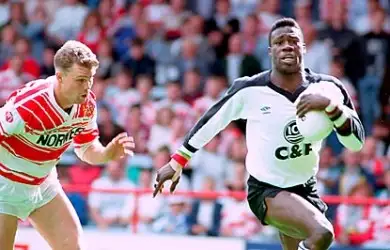From a major power to a sleeping giant

Once a major power, now a sleeping giant of the game, it is fair to say many clubs in the Championship have experienced tremendous falls from grace in recent years.
Huge financial pressures have made it increasingly hard for clubs to repeat their unprecedented success of yester year. The great Widnes team of the 1980s with the lightning quick Martin Offiah and Joe Lydon, not to mention Sheffield Eagles incredible Challenge Cup giant-killing win against Wigan in 1998, are sadly a thing of the past.
And as one Cooperative Championship club stares down the barrel of liquidation this week, Wales is once again lapping up more RFL backing.
The news that South Wales RLFC will join Championship 1 in 2010 will undoubtedly have rocked supporters of cash strapped Keighley Cougars. Newly-promoted Cougars are yet another financial casualty outside of Super League. In the past few years, Leigh Centurions, Widnes Vikings, Gateshead Thunder, Doncaster Dragons and Halifax have all endured well documented financial battles.
Two months ago, Barry Eaton guided his Cougars team to victory against Oldham in a thrilling Championship 1 Grand Final.
Now the Lawkholme Lane club face a bleak future with a court hearing imminent at London’s High Court on January 27th.
Renewed interest in Wales from RFL chiefs will ignite anger amongst many fans in Championship and Championship 1. A whole host of fans will believe their clubs are being disregarded once more in favour of the challenge to convert traditional rugby union heartlands into devoted followers of the 13 man game.
Celtic Crusaders have already been a flop in those parts, having already stated their intention to move to Wrexham. Their decision to up sticks to North Wales defeats the RFL’s objectives and is yet another sign of failure to break the Welsh market. The South Wales project is a puzzler. Giving the club a National Conference birth to start them off would have been a much better idea. Now it remains to be seen whether the cash-fuelled clubs’ owners will inevitably splash their money on an array of second-rate Australian imports to enhance their claim for a Super League licence.
The move to spread the game to Wales is another indication that RFL Chairman, Richard Lewis is defiant in his bid to manufacture a thriving rugby league community within the hills of the 15-a-side code.
The RFL should perhaps focus on affairs closer to home. The ‘Welsh adventure’ is not only over-looking the plight of so many cash crippled clubs, but also the potential to nurture emerging young English talents of the game. It is crucial to maintain the development of our potential stars from the lower leagues if we are to compete with Australia in the next ten years.
The amateur game has flooded the leagues in recent years with exciting prospects. Liam Harrison (Barrow), Ade Gardner (St Helens) and Shaun Lunt (Huddersfield) are just a few who have progressed through the ranks to become established Super League players.
Maybe there is a case for a National Conference side to feel aggrieved that they haven’t been considered for the third tier. Steeped in history, Cumbrian amateur club, Wath Brow Hornets or East Yorkshire club, Skirlaugh amongst others could have fit the bill perfectly and added something a little different to the competition.
The RFL need to get it right on English soil before they can make strides on Welsh territory.